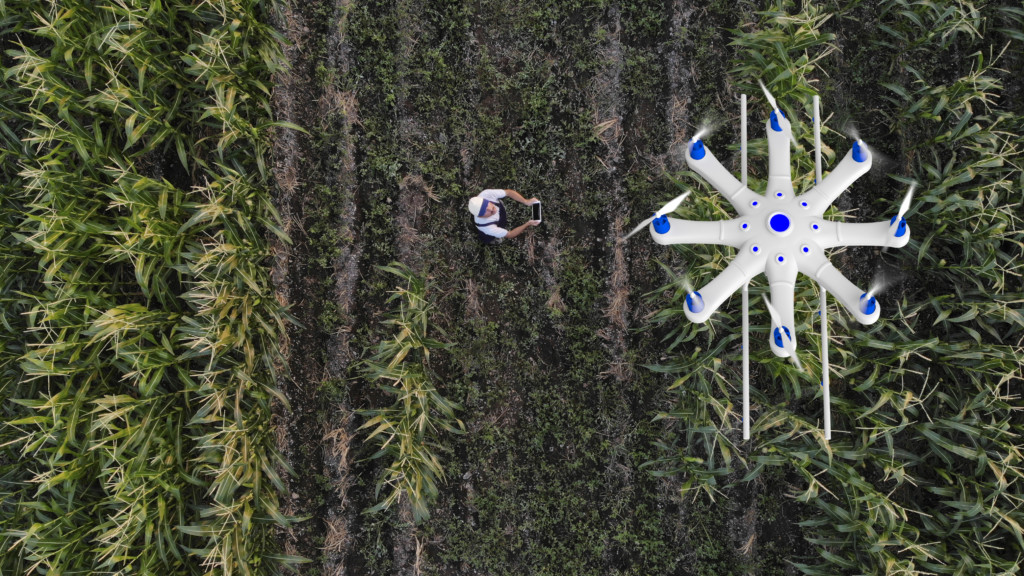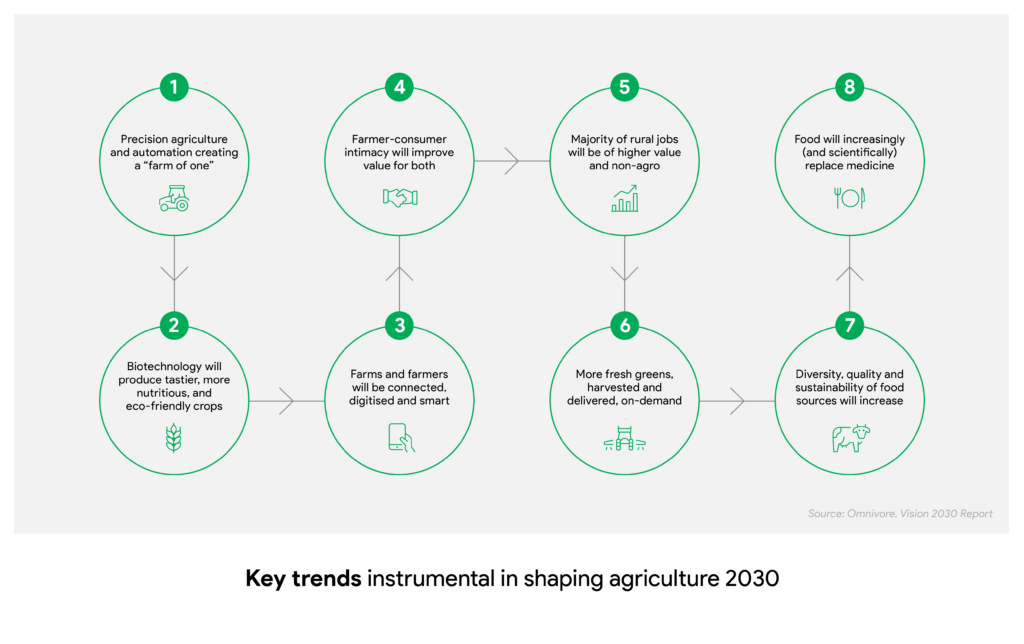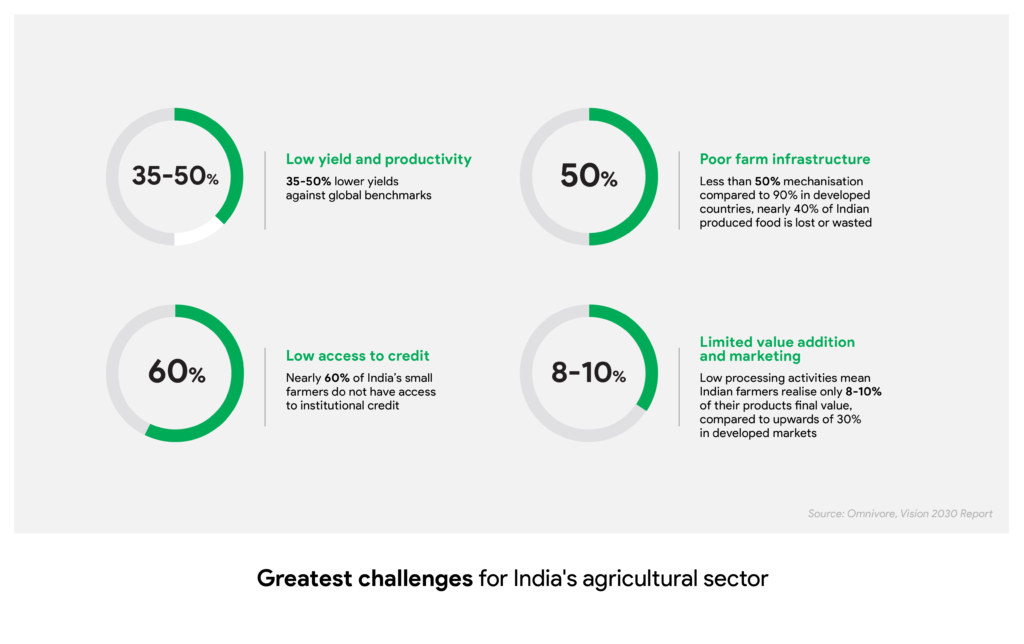India’s agritech market ‘takes off like a rocket’
As the Managing Partner of Omnivore – the largest and oldest player in the Indian agritech venture scene – Mark Kahn understands what it takes to really ‘make it’ after building a venture capital firm from the ground up that’s pioneered agritech investing in India.

What makes the success of Omnivore and its portfolio of more than 25 agritech startups more impressive is the environment in which it works. Agriculture and agribusinesses account for a quarter of India’s GDP and employ more than half of the population.
“In Indian agritech you have 130 million farmers and their families struggling to find solutions to get them out of the poverty traps that they find themselves in or address their sustainability challenge or help them get better terms of trade – and we’re seeing agritech firms here in India address those challenges,” said Mark.
And the impacts are significant.
“When you think about Australian farmers and agritech adoption, Australian farmers are already among the most competitive, highest yielding and most efficient in the world, so any solution in Australia is going to be a bit more incremental.
“The kinds of impacts you can have in Indian agriculture are huge because the efficiencies are simply not there in many cases, it’s all low hanging fruit, if you will.”
The opportunities for Australian agritech entrepreneurs
With a shared understanding of the climate change challenge, Mark said regardless of scale, Australia and India face similar challenges when it comes to farmer resilience in the face of environmental pressures.
“Both countries are amongst the most water stressed in the world, so the challenge of mitigation, resilience and adaption to enable farmers to manage in a new normal is very real,” he said.
“There are great opportunities for Australia to cooperate with India and I would say probably the biggest is on technologies related to water and drought resilience.”
“That is where I’d be spending most of my time if I were an Australian agritech entrepreneur trying to figure out what is relevant to the Indian situation.”

Photo supplied by Austrade.
However, if you’re in that space already, Mark’s greatest piece of advice would be not to move to India immediately.
“I’ve never seen a foreign startup succeed in India that was selling directly. Sometimes we have very well-meaning people that relocate their lives here and think they’re going to be able to build an organisation from the ground up and the reality is it’s just very difficult.
“The best thing you could do is get some Indian members on your team, co-create solutions that bridge the gap between whatever you’ve developed earlier and whatever our local farmers actually need and find local partners.
“You should be manufacturing in Australia or maybe India, but you don’t want to build a distribution system yourself and even if you try, you’re not very likely to succeed.”
Venture capital is jet fuel … and it can explode
While venture capital can be a great fit for some startups, Mark warned entrepreneurs to assess its suitability.

“This big, big problem we have in agritech, is that people have got this idea that venture capital is suited for every innovative company and it simply isn’t.
“I always try to tell people that venture capital is jet fuel. If you take jet fuel and you put it in to a Honda Civic, and start the engine the car explodes and the driver is dead.”
“If you take jet fuel and put it in to a sportscar and start the engine, still – the car explodes.”
Moral of the story? Jet fuel only works in jets.
“I think entrepreneurs need to be very conscious whether they are driving a Honda, driving a sportscar or flying a plane.”

Photo supplied by Austrade.
Enabling external factors in the Indian landscape
So what are the driving forces behind India’s agritech market and its success? Thanks to a range of enabling external factors, Omnivore and the Indian agritech market have grown significantly since 2011.
“I feel like this space really required certain enabling factors on the ground to succeed and starting in 2016 farmer adoption [rates] started to go up sharply, but it wasn’t just because of better agritech companies, it was because of the proliferation of 4G connectivity, mobile data, cheap smart phones, almost no cost digital transactions and the rise of a new mobile phone carrier.”
“All of these things pushed platform technology into rural India where they had not existed earlier. With this increased connectivity and digital payments and low-cost smart phones it created the conditions for agritech to really take-off in the last three years.”

The right conditions for ‘tremendous innovation’
Mark said the rise in agritech adoption was reflected in the 12-month period from April 19 to March 2020 where approximately $450M was invested in to Indian agritech startups from various venture funds.
“We expect when we crunch the numbers that April 2020 to March 2021 may cross $700M so this is a space of tremendous innovation.”
“It’s a space where we’re seeing more and more startups every year and it’s also seen fantastic commercial adoption by Indian famers especially in the last 12 months.
“While the pandemic has been a horrible human tragedy, it lit the match that has set off the rocket of Indian agritech.”
“As the lockdown in India has dragged on more and more, farmers and agricultural intermediates migrated to agritech platforms in order to get business done and in order to survive. We suspect that even post pandemic this migration from analogue traditional systems to innovative digital systems in the Indian agriculture sector will continue.”
India’s innovation spotlight:
- DeHaat – full-stack agritech company offering end-to-end solutions to Indian buyers & growers
- Sahyadri Farms – India’s largest farmer collective by trade volume
- Agritech: Towards transforming Indian agriculture (EY Report)
- Ag-tech in India – Investment Landscape Report
- NITI Aayog’s National strategy on AI & AIRAWAT
Accelerators: ThinkAg; AgriKul; a-Idea: Centre for Agri Innovation; Pusa Krishi; Indigram Labs
Incubators: Indian Angel Network; 10000 StartUps; Kerala StartUp Mission; CIIE: Co-operation Integrity Impact Empathy; T-Hub; Bionest; Amity Innovation Incubator; iCreate; Prime Venture Partners; dlabs; Venture Centre; unltdindia; SeedFund; Villgro;
Innovation hubs: India-Israel Innovation Hub; Accenture Innovation Hub; Esri-India
Omnivore’s ‘Vision 2030’
In 2020, Omnivore released its Vision 2030 Report that observes the trends and challenges of agritech in India in the future.
“We asked ourselves, ‘what will agriculture look like in 2030?’ and we wanted to think beyond 2020, beyond COVID-19, beyond our second fund, one decade into the future,” said Mark.

“The first thing that Vision 2030 highlighted was a generational challenge for us here in India that if we don’t address the challenge of climate change everything else in the future of Indian ag is mere speculation.”
“With that huge caveat though, I think the three major trends we’ll see will be the spread of precision agriculture and automation followed by the consolidation of the current fragmentation of landholders and asset ownership thanks to new digital platforms and marketplaces.
“The third major trend I think will be the rising of animal protein and dairy consumption which will push tech adoption across the animal and fishery value chains, thereby increasing diversity of diet, pushing up efficiency, and lowering costs.”
Have you watched Austrade’s ‘Discovering Indian Agritech Series’? Click to watch Part 1, Part 2, Part 3 & Part 4.
Enjoyed this story? Want to learn more about the Asia Pacific region’s innovative agrifood tech ecosystem? Sign up for our newsletter here and receive fresh stories about global leaders, farmers, startups and innovators driving collaborative change.
